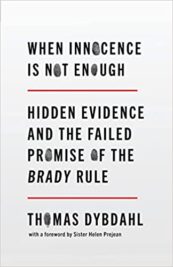
By Tom L.Dybdahl. Illustrates the promise and shortcomings of the “Brady Rule” — which the Supreme Court decreed in 1963 that prosecutors must share favorable evidence with the defense—as a part of a suite of decisions of that reform-minded era designed to promote fairness for those accused of crimes.
Through storytelling and attention to crucial cases — including the infamous 1984 murder of Catherine Fuller in Washington, DC. which led to eight young Black men being sent to prison for life after the prosecutor hid information that would have proven their innocence.
Chronicles the evolution of the Brady rule — from its unexpected birth to the series of legal decisions that left it defanged and ineffective. Yet shows a path forward by highlighting promising reform efforts across the country that offer a blueprint for a legislative revival of Brady’s true spirit. Read more.
